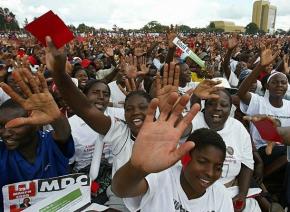By VIVID GWEDE | 2012-09-25
In Zimbabwe, most youngsters who have turned 18-years-old, would rather not have anything to do with politics because it is “a dirty game”.A very small section of these youths will ever vote in national elections or opinion polls, and a negligible number of young Zimbabweans will be involved in mainstream political participation.Most of those who would be involved remain at the level of foot soldiers or violent hit squads, and what is even more revealing is that very few of these actually vote.

Young people constitute more than half, some 67% of the national population, the largest section of the entire Zimbabwean population, but less than half of the entire voting population.This has been the case in the past, before independence as a result of racist laws, and since the end of colonial rule, and the advent of universal suffrage under the euphoric mantra of “One-Man One-Vote”. If anything, there is no likelihood that this trend is going to change in the coming election to end the Government of National Unity.As anyone might correctly suspect, this weirdness in the political demographics is not as a consequence of political naivety of local youngsters, or free choice because such a free choice to participate in politics never occurred since our national independence in 1980. It is the evidence of three decades of marginalisation by nationalist leaders. Young people of “the born-free generation” were born into this generational marginalisation and ostracism. It is only in recent times after the formation of the Inclusive Government that we have heard talk about youth empowerment which has largely remained a small urban legend. In truth, what began as a jocular epithet in the form of the “born-free” label after independence especially in the ‘90s, as far as one remembers, became a real marginalising philosophy as soon as youth revealed their keenness to be part of the political life of Zimbabwe, even after the emergence of multi-party politics towards the end of that decade.

The fact that the nationalists of Zimbabwe failed to deconstruct the “born-free” complex, but sought instead to perpetuate it means that they failed to institute political succession from the endless oligarchy of the so-called liberation generation to the young Zimbabweans beyond the populist slogans of youth empowerment and indigenisation.
It should be remembered that with the advent of the MDC, the youth did feel an opportunity was being presented for them to be part of the political processes in the country through a new platform which echoed their political thinking after many years of marginalisation by Zanu PF, but soon they were being targeted for grave assault at the hands of the war veterans and the political handlers of these ex-combatants who claimed a monopoly of politics in Zimbabwe. Only a few youths, after independence from colonial rule, and before the formation of the MDC, would manage to lend a voice to the political debate in the country through the platform of the student movement, which became “the voice of the voiceless” whose influence extended beyond the universities and colleges as many analysts confirm, and source of inspiration for many Zimbabweans especially the young people. But even this platform ran into a big conundrum as many laws such as the Public Order and Security Act and Access to Information and Protection of Privacy Act were soon put in place, and the security forces were called into battle on behalf of the nationalist state to entrench the marginalisation of an energetic and politically conscious movement of young people which was on the rise. Many student leaders were dismissed from learning institutions on the basis of their quest to participate in national politics. In more dramatic instances, some university students were killed in cold blood, such as Lamerk Chomumvura, Batanai Hadzidzi and others.

From this short background, it easily becomes apparent that the current political apathy by young Zimbabweans, and subsequently the political leadership gap it creates is a result of many years of intimidation, harassment and marginalisation from the political arena by a gerontocratic ruling class. This marginalisation has led to a prevalent sense of hopelessness and resigned disinterest. This is more apparent when we consider the rising levels of alcoholism and drug abuse by young people in the country. Those desperate and gullible youths who have resigned to be used by politicians as violence squads in the hope of gaining a modicum of personal empowerment have run into more serious social problems.
More recent events, in other sectors like the economy, may have contributed to this pervasive despondency of young Zimbabweans such as the crackdown on young artisanal miners in Chiadzwa through force and violence of the national security institutions at the height of the economic crisis in the country.

These major events, amongst many others, may have also led to economic marginalisation of young people beyond the political marginalisation, outside rhetoric of youth empowerment and indigenisation, which should run hollow to young Zimbabweans considering the prevalent unemployment and poverty.
The current clauses in the Copac draft constitution, which faces the danger of being torn apart by reckless political contestations, provide for a range constitutional frameworks for enhanced civil freedom for the ordinary person to participate in political processes, should be seen as a positive step towards dispelling in the long term the current political apathy of young Zimbabweans. An example of such important provisions is the right to demonstrate and bring public officials to account as well as stipulations which promote free and fair elections. Moreover, the constitutional provision for term limits in key public positions should also be commended as an important step towards creating an institutionalised culture of ending the long tale of youth marginalisation, generational succession which has been the missing link between the young and old generations in the country. However, much more needs to be done through enabling policies to improve the welfare of young people in all life spheres. The government of Zimbabwe should move speedily towards this direction..
Vivid Gwede is a former student leader and social commentator. He writes here in his personal capacity.
Source : http://www.newsday.co.zw/article/2012-09-25-tale-of-youth-marginalisation-in-zim/
